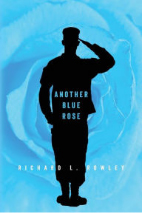
Richard L. Rowley
Another Blue Rose
Copyright © 2015, Richard L. Rowley
website by PageTurner.net
Admin Panel
Thank you very much for visiting my website. Here you will find information about me and a few of the important topics raised in my novel “Another Blue Rose”. Please feel free to contact me though my contact information, or just take a look at what’s going on through my Facebook page.
Books. Books.Books. Where would the world be without them? A good novel should propel you into another place and time, or make you take a double look around you to see if the author is standing there with you. That was one of my goals in writing “Another Blue Rose.” I wanted to get close to the reader. I wanted to say something that would resonate with them. I wanted to say something so common in life that anyone could identify with at least one of the characters.
Almost every city in this country has a homeless community or has a presence of veterans. Whether it’s a rural town in northern Idaho, or a thriving mega-city like New York City, there is always a community entwined within a community that has a story. In writing Another Blue Rose, I merely provided the stage, brought the characters together, and let them interact. Sometimes there was peace, while at other times …. Well, if you’ve read the book, you know what I mean.
Thank you, again, for taking these precious moments to share with me on this website. Please be certain to let me know what you think of the novel, my webpage or writing in general, through my Contact page.
Another Blue Rose is a contemporary novel written by attorney Richard L. Rowley. The novel presents Kendrell Morrison, an ambitious African American law student, who encounters old friends from Detroit, old loves, and a unpredictable Iraq war veteran named Elijah Highbaugh as he pursues his quest of graduating from law school. Kendrell’s goals bring him face-to-face with a past that he wanted to forget and a future that is not quite as certain as he had thought.
Kendrell never stopped believing. He could never let go of his dream of becoming an attorney. He owed it to himself. He owed it to his African American ancestors. But somewhere along his journey from a child in the Detroit schools to a student in the classrooms of Ogletree Law School, Kendrell discovers that his greatest obstacle might be the dream itself. Old friends from the neighborhood, old loves, a wily homeless veteran name Elijah Highbaugh bring Kendrell face-to-face with homelessness in America and his own definition of success.
Another Blue Rose transports readers into a world where extreme poverty exists side-by-side with extreme wealth. It takes an unabashed look at the often ignored plight of United States veterans who upon returning home from active duty, struggle with the simple necessities of life such as eating, having a place to stay at night and maintaining at least a muster seed amount of self-dignity.
Many are those who see others hurting and do nothing. It is the Good Samaritan who has the courage to see those in need and to reach out and do something. Streets in downtown areas throughout our country are filled with the uncounted and the unseen: Individuals that move throughout our restaurants libraries and institutions of higher learning, but are not eating, reading or taking classes. They are moving from place to place. Sometimes they blend into the crowd, other times they stand out as different. They are the homeless. People whom have experienced some event, something, that has tossed them from the road to success and have found themselves in the alley of despair.
These individuals are men, women and children that have the same basic needs as those who scoff at them in disgust or turn their heads away. It is imperative for us all to rally behind these individuals in one way or another. BE the Good Samaritan in their lives.
One such organization is the Creative Change Project. This unique movement seeks to educate people regarding the social discrepancies of the homeless, advocate for the establishment of rights for the homeless community through the Homeless Person’s Bill of Rights and provide for “hands-on” cultural competency experience through the “Walk a Mile in My shoes – Homeless Experience”, which Richard participated in during the spring of 2015. The Project has a newsletter, lists of speaking engagements, and a short film about its founder Maurice Young and other helpful information on its website at: http://indy26aug.wix.com/indyhbr
The United States Interagency Council on Homelessness estimated that there were approximately 50,000 homeless veterans in the United States during 2014. Efforts are being made at the local and federal levels, but the numbers are still staggering. Efforts include the federal Opening Doors program and the Veterans Affairs Supportive Housing program. And have seen success over recent years, these efforts are moving in the right direction, but the success for some still means countless others remaining on the streets without home. Local efforts targeted toward veterans’ homelessness are also needed.

There are many individuals that suffer a traumatic event that will be diagnosed as having Post Traumatic Stress Disorder or “PTSD”. This condition may be present in military and civilian individuals. WebMD defines PTSD as: A serious condition that can develop after a person has experienced or witnessed a traumatic or terrifying event in which serious physical harm occurred or was threatened. PTSD is a lasting consequence of traumatic ordeals that cause intense fear, helplessness, or horror, such as a sexual or physical assault, the unexpected death of a loved one, an accident, war, or natural disaster. Families of victims can also develop PTSD, as can emergency personnel and rescue workers. (1)
PTSD may be military or non-military-related. Many individuals who have experienced traumatic events in their homes or other places may be susceptible to the condition. Veterans, though, are hardest hit by this mental affliction. According to the VA’s National Center for PTSD:
Symptoms of PTSD include:
Treatments vary widely from medicines, to cognitive behavioral therapy to eye-movement desensitization and reprocessing therapy.
A video interpretation of a song by Jason Moon called “Trying to Find My Way Home” may be found at: https://www.youtube.com/watch?v=5koLyr6rpWY. This song has served as my inspiration throughout the writing of “Another Blue Rose”. Please take 5.58 minutes to check out the video.
[youtube https://www.youtube.com/watch?v=5koLyr6rpWY]